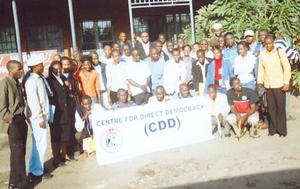CENTRE FOR DIRECT DEMOCRACY (CDD) – KENYAMission | Objectives | Program | Principles | Activities | Contact 1. INTRODUCTION
The Centre seeks to join the wider civil society in developing the existing body of knowledge, skills and experiences in citizen participation. The Centre also provides tools to strengthen citizen and community groups through training in grassroots organizing and monitoring of service delivery systems in Kenya. 1.1. CDD’s PhilosophyThe Centre’s programs are based on the Universal Declaration of Human Rights and the Covenant on social, cultural and political rights, which upholds individual right to participate in decision making on local and national issues. The Centre believes that participation is a universal aspiration of all citizens that can be realized through creation of effective governance systems, popular participation and proper research and dissemination of information. 1.2. CDD’s VisionThe vision of CDD is of a Kenya where all citizens enjoy all their economic, social, cultural and political rights and actively participate in decision making, policy processes and the governance of the country in a manner that captures and reflects the shared aspirations and desires of the people of Kenya. 1.3. The Mission of CDDThe Centre for Direct Democracy (CDD) is dedicated to helping the people and the leadership of Kenya nurture a culture of full participation. We believe that all citizens have the right to directly perform lawmaking and other socio-economic functions in any polity in which they live. Therefore the centre seeks to develop and promote participatory processes, which allow people to exercise their rights, participate in their governance and determine their socio-economic destiny. 1.4. Legal StatusCDD is registered as a national Non-Governmental Organization (NGO) under section 10 of the Non-Governmental Organizations Co-ordination Act of the Republic of Kenya 2. THE OBJECTIVES OF CDD
3.1. Policy Analysis and Advocacy (PAA) Program The PAA program seeks to provide accurate information on and produce popular versions of various government policies, identify existing policy gaps and carry out analysis of the impact of such policies on the citizens at all levels of the Kenyan society. The program will help to create an informed citizenry who understand various national policies, the inherent gaps and therefore well placed to carry out advocacy activities from a position of strength and with the benefit of proper information in the right forms. The target policy areas include poverty reduction, the constitution, youth policy, national food security policy, and national health policy among others. 3.2. Public Engagement (PE) Program The PE program aims at taping views and public opinion of different sections of the Kenyan society in regards to their involvement in national policy making processes and the management of public affairs in the country. Under this programme, CDD endeavors to inculcate a culture of direct democracy in various institutions and individuals using regular interactions through such forums as:
Through this program, CDD expects to build a critical mass to campaign for a national culture of popular participation where leaders and institutions respect the power of the people. 3.3. Capacity Building Program CDD conducts trainings for various community groups and peoples organizations in order to build their capacity to participate effectively in governance and in influencing national policies. In this program CDD’s partners will include but not limited to the following organizations:
CDD strengthens the organizations on citizen coalition building, mobilization, advocacy and civic organization. 3.4. Research and Dissemination Program CDD conducts research and documentation on various policy issues and also creates awareness on the need to embrace participatory approaches to governance and development. In particular, CDD emphasizes research, documentation and dissemination of information in the distinct area of ‘Economic Democracy (ED)’ by assessing and enhancing citizens’ participation in economic development (or the lack of it) both at the micro (household and community) and the macro (national) levels up to and including an ED approach to research and dissemination on the global economic order. 4. CDD BELIEVES IN THE FOLLOWING PRINCIPLES:
5. CDD's LATEST ACTIVITIES (Third and Fourth Quarter 2005)
Workshops on “Citizens’ Participation in Constitution Making” (Ongoing)
Policy Analysis and Publication in the area of Participatory Approaches to Development and Governance. Public Activities: Forums, Lectures and Peaceful Marches. Mainly around the issues of the People’s supremacy in constitution making and governance in the country. Most of these activities are done jointly with other civil society organizations. 6. CDD LEADERSHIP: Chairman and Executive Co-ordinator: Mr. Omondi George.
7. The CDD Secretariat Contact Information:
The Centre for Direct Democracy (CDD)
Telephone: 254-02-552387
|
